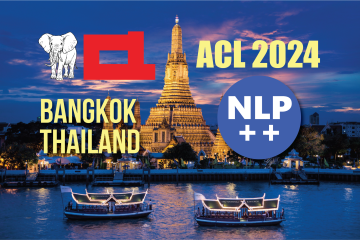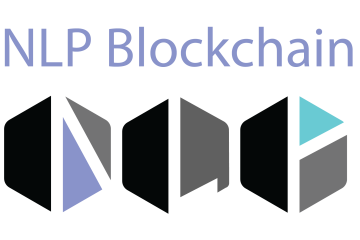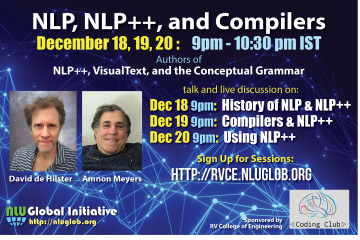A New Vocabulary to Replace “AI”
David de Hilster is on the warpath. He is tired of all the “hype” vocabulary used in “AI”. Find out how he plans to change this with simple word changes.
![]()

I have been in computational linguistics for more than 40 years, and this is the first time I have been to the most important conference in our field: the annual Association of Computational Linguistics (ACL) Conference. As part of the registration process, I became a member for the first time […]
![]()

Part of the Natural Language Understanding Global Initiative is the Global Dictionary Initiative. The idea is to product NLP++ dictionary files for all the major languages of the world. VisualText and NLP++ are being used to parse Wiktionary pages as well as other digital resources in order to create NLP++ […]
![]()

Sachi Patel is a Data Engineer who recently received her Master of Science in Data Analytics Engineering at Northeastern University. She specializes in architecting and optimizing end-to-end ETL pipelines, leveraging technologies such as Apache Spark, AWS, and Apache Airflow to ensure reliable, scalable data integration and processing. With a strong […]
![]()

Niranjan Kumar Ilampooranan recently earned his Master’s in Robotics Engineering from WPI, where he was also a graduate research assistant in the ELPIS (Efficient Learning and Planning for Intelligent Systems) lab. He is also a recipient of Dr. Glenn Yee Graduate Student Tuition Award, a scholarship awarded to outstanding robotics […]
![]()

Northeastern University is launching an innovative, zero-credit course that leverages blockchain technology and the rule-based programming language NLP++ to build a decentralized, human-driven natural language processing ecosystem.
![]()

David de Hilster is on the warpath. He is tired of all the “hype” vocabulary used in “AI”. Find out how he plans to change this with simple word changes.
![]()

Chad P. Guzzi is a technology entrepreneur and legal scholar specializing in blockchain and ai. Chad holds a Bachelor of Science in Business Administration with a concentration in Finance and a minor in Decision Science from Carnegie Mellon University. While at Carnegie Mellon, he collaborated closely with the computer science department, […]
![]()

Zac Cohen is an accomplished executive and entrepreneur with nearly a decade of experience in Web3 and blockchain technology, complemented by over 15 years in Web2 infrastructure and cloud solutions. As Co-Founder and former COO of Filebase, Zac spearheaded the creation of a pioneering platform integrating decentralized storage networks through […]
![]()

Matthew “FractionalMateo” Stroul is a seasoned technology executive and consultant known for seamlessly blending technical expertise with strategic vision to drive digital transformation. With key roles as CTO, CIO, and Solutions Architect at organizations like Future Tech, he has led innovative initiatives ranging from smart city feasibility studies to blockchain-protected […]
![]()

Before you panic and spend $1995 on that “Prompt Engineering” class, read this book. It will not only save you lots of money, but it will save two of the most important things you have: your time and your sanity.
![]()

The co-authors David de Hilster, and Amnon Meyers, of the NLP++ programming language and framework are finishing up their first textbook on NLP++ entitled: “Trustworthy Rule-Based NLP with NLP++”. They are looking to have the book ready by fall 2025 in time to be used by RVCE University which is […]
![]()



With the official launch of the NLPPlus Python package, we are now focusing on the best way to introduce it to the Python community. The major message? NLPPlus is NLP that is 100% customizable. Where other NLP packages and toolkits are turnkey and supposedly do not require any customization, they […]
Read more
Elisha K. Silas is a computer scientist specializing in distributed systems and cloud computing, with a strong focus on scalable server-side application development and AI-driven solutions. He holds a bachelor’s degree in information systems and technologyfrom the United States International University Africa and brings four years of professional experience in designing […]
![]()

Four-Day NLP++ Workshop at RVCE University Computer science students at RVCE University in Bengaluru India were given an up-close look at NLP++, the universal programming language for text and NLP, by co-authors David de Hilster and Amnon Meyers. This was the first NLP++ workshop offered for college credit. NLUGLI and […]
![]()

NLP++ authors David de Hilster and Amnon Meyers will be conducting a virtual workshop on NLP, NLP++, and Compilers from December 18 – 20, 2024. Sign Up For Each Session Here are the three sessions and a link to sign up. YOU MUST SIGN UP FOR EACH SESSION SEPARATELY. The […]
![]()